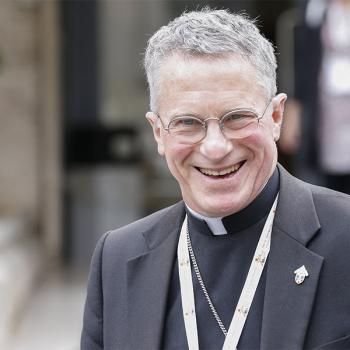Editor's Note: This is the second in a two-part series on Jesus' death and resurrection, featured as part of the Patheos Book Club on Jesus and the Demise of Death. Read Part One here.
 It seems popular these days to assume a hopeful agnosticism about eternal life. That is, many people are finding it useful for one reason or another to remain rather tight-lipped when it comes to the topic of life after death. Though we are routinely exposed to commercials that depict angels sitting on clouds with harps, and though we still hear some ask if we know where we're going when we die, many people today prefer not to think on the topic. Those who do wonder about eternal life often seem to do so with a sort of courageous tone as they suggest they're willing to face total annihilation if that's what's in store. But what does this mean for the value of human life? If we are meant to see this life as a farce that ends with a sudden gasp and disappears from reality forever, how can we take our lives seriously? How will we regard the lives of others—especially the inconvenient, the undesirable, the supposedly useless? From a Christian perspective, it seems that considering life after death seriously is perhaps one of the best ways to learn to live life with others before death.
It seems popular these days to assume a hopeful agnosticism about eternal life. That is, many people are finding it useful for one reason or another to remain rather tight-lipped when it comes to the topic of life after death. Though we are routinely exposed to commercials that depict angels sitting on clouds with harps, and though we still hear some ask if we know where we're going when we die, many people today prefer not to think on the topic. Those who do wonder about eternal life often seem to do so with a sort of courageous tone as they suggest they're willing to face total annihilation if that's what's in store. But what does this mean for the value of human life? If we are meant to see this life as a farce that ends with a sudden gasp and disappears from reality forever, how can we take our lives seriously? How will we regard the lives of others—especially the inconvenient, the undesirable, the supposedly useless? From a Christian perspective, it seems that considering life after death seriously is perhaps one of the best ways to learn to live life with others before death.
The Christian tradition has long held that we are a wayfaring people, in passage from a beginning in time to an end after time. As the Jews sojourned from Egypt, through Sinai, to the Promised Land, and as Christ sojourned from birth, to ministry, to the Cross, to the resurrection and ascension, so Christians are making a pilgrimage along a certain way. From this perspective, life is not only a biological phenomenon that ends with death, but also a spiritual one that opens onto eternity. Christians see the wayfarer's journey as progress from separation from God to unity with him, from alienation from neighbors to solidarity with them. The Christian tradition also provides us with concrete ways to recognize this passage through time. The Church as portrayed in the Book of Acts, for example, is characterized by three essential practices: the preaching/teaching of the faith by the apostles, the sharing of the Eucharist, and the sharing of possessions, or almsgiving. Where the truth of the faith is proclaimed and taught, the community of faith abides. Where disciples gather around the Eucharist, the community of hope looks forward to eternal union with God. And where abundant generosity is practiced, the community of charity is alive.
These three characteristics of the Church—teaching of the faith, Eucharist, almsgiving—are adjusted to our state as wayfarers on a journey. Indeed, we require instruction and an increase in knowledge of the things of God in order to grow in wisdom and humility. We must learn to wait patiently for the Lord even while we enjoy a measure of communion with him now. And we must learn to give generously in order to imitate and embody the love of God given to us in the gift of Christ. But this is not the end of the story. Really, it is only the beginning. The three characteristics of the Church in time can also show us something about what life will be like in eternity.
Regarding the teaching of the faith, what Christians come to realize is that we are not learning to assent to a list of propositions. We are not only learning something. No, we are coming to know someone -- a person. As the disciples received the faith primarily by believing in a person they knew intimately—Jesus—so are we on our way to a knowledge that can only really be spoken of in terms of vision. After death, we will not simply know something important about God. Rather, we will be like God, for we will see him as he truly is.
In the Eucharist, Christians learn that God has provided food for the journey of this life. It is a foretaste of the love we will share with God and with others in heaven. At the Eucharistic table, we can look back to Christ's sacrifice on our behalf, but we can also look forward in hope to the marriage banquet at the end of all things.
With the practice of almsgiving, Christians begin to understand the generosity of God, who desires to share his life with us even now, but perfectly in eternity. In showing mercy and generosity to others, we testify to God's mercy in sending Christ and his generosity in sending the Spirit. So, when we meet others' needs out of love for them, we are already participating in that life with God, where he will be all in all, where there will be no more weeping, mourning, suffering, or need.




